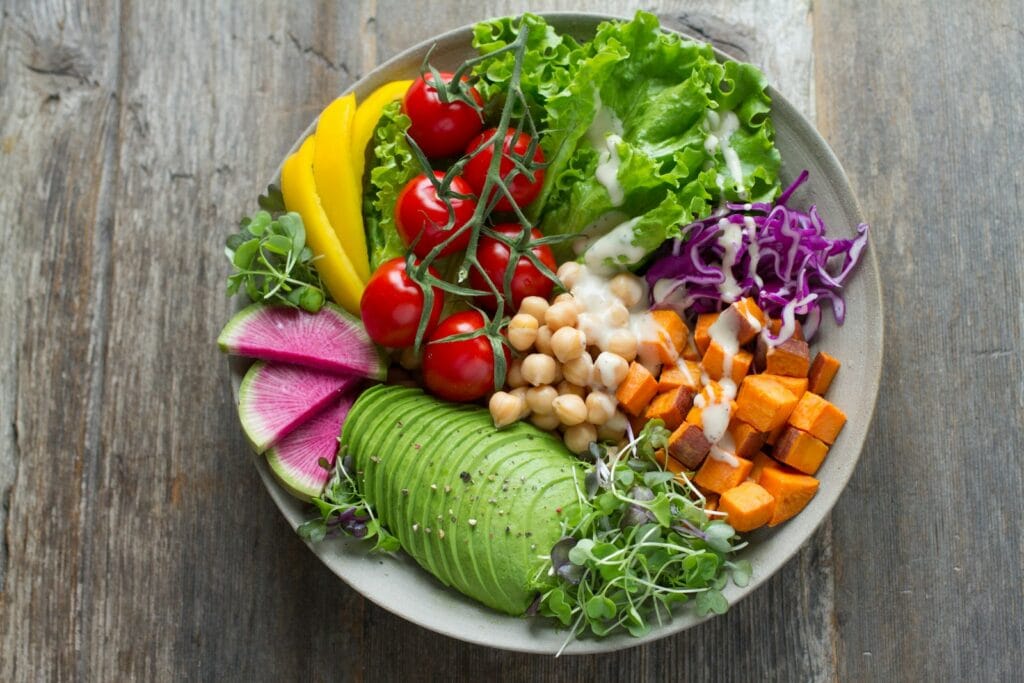What you eat really does affect how you feel. If you’re reaching for sweet drinks, fried stuff, or lots of processed meats, research shows you might be raising your risk for depression. But with a few smart food choices, you can help keep your mood steady and support emotional balance as you go about your day.
Your gut and brain are surprisingly connected. Foods like yogurt help keep your gut microbiome healthy, which is important for making serotonin—one of the main chemicals that keeps your mood in check. Bananas, oats, and berries are good too; they have nutrients that might boost brain chemicals like dopamine and serotonin.
Adding omega-3 fats to your diet, like those in avocados, can help ease anxiety and offer other benefits. Sometimes, just being a little more thoughtful about what you eat can lay the groundwork for better mental health.
Key Takeaways
- What you eat directly shapes your mood by affecting brain chemicals and gut health.
- Yogurt, berries, and bananas can help boost serotonin and keep your emotions steady.
- A diet with less processed food and more omega-3s is good for both your mind and body.
The Role of Nutrition in Emotional Balance
Your food choices matter—a lot. They can change your brain chemistry, energy, and even how you react to stress. The right nutrients feed both body and mind.
How Diet Impacts Mood Regulation
Every day, what you eat gives your brain the raw materials it needs to make mood-regulating chemicals. When you eat a balanced diet, you’re helping your brain create neurotransmitters like serotonin and dopamine.
Blood sugar swings can throw your mood off. High-glycemic foods spike your blood sugar, then drop it, leaving you tired or irritable. Complex carbs like whole grains keep your energy—and mood—more even.
Processed foods with artificial additives can sometimes mess with your mood. Focusing more on whole, real foods can help you feel more emotionally balanced.
Anti-inflammatory foods are another win for your mood. Berries, leafy greens, and fatty fish help cut down on inflammation in your body and brain.
Key Nutrients Influencing Emotional Well-Being
Omega-3 Fatty Acids: These are in fatty fish, walnuts, and flaxseeds. They’re essential for brain health and help lower inflammation that can mess with your mood.
B Vitamins: You’ll find these in whole grains, eggs, leafy greens, and legumes. B vitamins help your body make energy and create neurotransmitters.
Vitamin D: Known as the “sunshine vitamin,” it plays a role in mood. Besides getting sunlight, you can get vitamin D from fatty fish, fortified foods, and egg yolks.
Minerals for Mood: Magnesium, zinc, and selenium support mental well-being. Nuts, seeds, whole grains, and veggies are all good sources.
Antioxidants protect your brain cells. Colorful fruits and veggies are loaded with them, and they support cognitive function and mood.
The Gut-Brain Connection and Mood
Your gut and brain are in constant conversation—that’s the gut-brain axis at work. So, your gut health can really shape how you feel and think.
The trillions of bacteria in your gut (the microbiome) actually make some of the same neurotransmitters your brain uses. When these bacteria are in balance, you’re more likely to feel emotionally balanced too.
Probiotics, found in fermented foods like yogurt, kimchi, sauerkraut, and kefir, can help your gut—and your mood.
Fiber feeds those good gut bacteria. So, eating lots of fruits, veggies, whole grains, and legumes keeps your microbiome happy.
Cutting back on sugar and processed foods helps your gut barrier stay healthy, which can prevent inflammation that might mess with your mood.
Best Foods for Emotional Balance
Some foods just seem to help your mood and emotional health more than others. Here are a few worth adding to your plate.
Mood-Boosting Foods and Their Benefits
Fatty fish like salmon are packed with omega-3s, which are great for your brain and mood. These fats help build brain cells and fight inflammation.
Avocados are loaded with healthy fats, B vitamins, and magnesium. Even half an avocado a day can make a difference for your mood.
Dark chocolate (the kind with at least 70% cocoa) has compounds that boost serotonin. A couple squares a day is enough for benefits—no need to go overboard.
Berries, especially blueberries, are rich in antioxidants that protect your brain. They also give you a bit of natural sugar for quick energy, but without the crash.
Bananas bring vitamin B6 and tryptophan, both needed for making serotonin. Plus, they’ve got magnesium, which can help you relax.
Nutrients That Support Stable Moods
Omega-3s (DHA and EPA) are crucial for brain health. Besides fish, you can get them from walnuts, flaxseeds, and chia seeds.
B vitamins help make neurotransmitters like dopamine and serotonin. Eggs, leafy greens, and whole grains are good sources.
Protein-rich foods give your body amino acids, which are the building blocks for neurotransmitters. Beans, lentils, tofu, and nuts are all solid options.
Magnesium helps your body handle stress and unwind. Spinach, almonds, and whole grains are packed with it.
If you’re low on iron, you might feel tired or down. Lentils, spinach, and pumpkin seeds can help keep your iron up.
Vitamin D affects mood, too. Sunlight is best, but fatty fish and fortified foods can help you get enough.
The Impact of Antioxidants and Polyphenols
Antioxidants help your brain fight off damage from stress. You’ll find them in colorful fruits and veggies, so try to mix it up.
Polyphenols are plant compounds that lower inflammation and help your brain. Green tea has L-theanine, which can help you relax but still stay alert.
Turmeric has curcumin, a strong anti-inflammatory that might help with depression. Add black pepper to help your body absorb it.
Berries are some of the best antioxidant foods out there. The more often you eat them, the more benefit you’ll get.
Leafy greens like kale and spinach are high in folate, which helps your body make serotonin. Low folate has been linked to depression.
Fermented Foods and the Gut Microbiome
Your gut and brain are always chatting, thanks to the gut-brain axis. A healthy gut microbiome keeps your mood steadier.
Yogurt with live cultures brings helpful bacteria that can influence how you feel. Go for plain yogurt and add your own fruit to dodge extra sugar.
Kimchi, sauerkraut, and other fermented veggies are good for your gut and also give you fiber.
Kefir has even more probiotic strains than yogurt and is often easier to digest if you’re sensitive to lactose.
Processed foods can harm gut bacteria and lead to inflammation that affects mood. Whole foods are a better bet for gut and mind.
With fermented foods, consistency is key. A little bit every day works better than a lot once in a while.
Dietary Patterns and Lifestyle Choices for Emotional Stability
Your eating habits really do tie into how you feel. There’s a clear link between diet and emotional well-being.
Adopting a Balanced Diet for Mental Health
The Mediterranean diet is often praised for supporting mental health. It focuses on fruits, veggies, whole grains, legumes, and healthy fats like olive oil.
Omega-3-rich foods like fish, walnuts, and flaxseeds are great for your brain.
Tryptophan-rich foods help your body make serotonin. Turkey, eggs, and cheese are good sources.
Fiber helps your gut microbiome, which is tied to how you feel. Fermented foods like yogurt, kefir, and sauerkraut are great additions.
Plant-based diets can boost emotional stability, but make sure you’re getting enough protein from beans, tofu, or tempeh.
Foods and Habits That May Disrupt Emotional Balance
Processed foods with lots of sugar can mess with your mood. They spike your blood sugar, then leave you crashing.
Too much caffeine—especially late in the day—can make you anxious or irritable. Cutting back after lunch can help.
Alcohol might seem relaxing, but it actually messes with your brain chemistry and can make anxiety or depression worse.
Highly processed foods don’t have the nutrients your nervous system needs, and additives can make stress worse.
Skipping meals isn’t great either. It can make you cranky and scatterbrained.
Maintaining Stable Blood Sugar Levels
Complex carbs, like brown rice, quinoa, and oats, release energy slowly and keep blood sugar steady.
Adding protein and healthy fats to meals slows digestion and helps avoid sugar crashes.
Eating regularly—smaller meals every few hours—can help keep your energy and mood on an even keel.
Staying hydrated helps too. Water is your friend; sugary drinks, not so much.
Paying attention to how foods make you feel can help you figure out what works best for your mood.
Frequently Asked Questions
Food choices have a direct impact on emotions and mental health. Some foods can help you feel better, while others might make things worse.
What are the best foods to eat for maintaining mental health?
Foods with omega-3s support your brain and mood. Fatty fish like salmon, mackerel, and sardines are top picks.
Whole grains help keep your blood sugar steady and prevent mood swings. Go for brown rice, quinoa, and oats.
Leafy greens like spinach and kale are rich in folate, which is important for making mood-boosting neurotransmitters.
Fermented foods such as yogurt, kefir, and sauerkraut support your gut, which is linked to mood through the gut-brain axis.
Which fruits are known to enhance mood and emotional well-being?
Berries are packed with antioxidants that help your brain and lower inflammation. Blueberries, strawberries, and blackberries are all great.
Bananas have vitamin B6, needed for serotonin, and their carbs help keep your energy up.
Citrus fruits like oranges and grapefruits are high in vitamin C, which helps lower stress hormones. Plus, their scent can give you a quick mood lift.
Avocados have healthy fats and B vitamins that support brain health and may help with anxiety.
Are there specific foods known to deteriorate mental health or mood?
Highly processed foods with lots of added sugar can cause big swings in blood sugar, leading to irritability and mood dips. Try to limit cookies, cakes, and sugary cereals.
Drinking too much alcohol can mess with your sleep and drain nutrients your brain needs, making anxiety or depression worse.
Trans fats—found in some fried and packaged foods—raise inflammation, which is linked to depression. Check labels and avoid hydrogenated oils.
Artificial additives and preservatives might affect brain function in some people. Sticking with whole, minimally processed foods is usually a good move.
How does diet impact overall emotional health?
Your brain needs certain nutrients to make the chemicals that control your mood. If you’re missing these, you might notice you feel down more often.
Keeping your blood sugar steady is important too—it can really affect how you feel. The Mediterranean diet and traditional Japanese diet? Studies suggest they might lower your risk of depression by about 25-30%. That’s not nothing.
What you eat also shapes your gut microbiome. It turns out, your gut actually makes a lot of the same neurotransmitters as your brain. So, a healthy gut often leads to a happier mind. Who would’ve thought?
Eating regular meals helps prevent those cranky, hungry moments and keeps your energy from crashing.
Can certain foods provide an immediate boost to happiness?
Dark chocolate is a classic pick-me-up. It has compounds that kick up your endorphins and can give you a quick mood boost. Go for at least 70% cocoa if you want the most benefit.
Green tea’s another good option. Thanks to L-theanine, it can help you feel both calm and alert—usually within half an hour or so. That combo is pretty rare.
If you’re craving something more filling, complex carbs like sweet potatoes can raise your serotonin and brighten your mood, sometimes within an hour or two.
And then there’s turmeric. Its curcumin might help lift your mood by boosting BDNF levels in the brain. Just don’t forget the black pepper—it actually helps your body absorb more curcumin.
What dietary choices can help improve feelings of emotional wellness?
Eating regular, balanced meals can really help keep your blood sugar steady. Try to get some protein, healthy fats, and complex carbs in each meal—nothing fancy, just the basics.
Hydration matters more than most people realize. If you’re even a little dehydrated, you might feel cranky or have trouble focusing. It’s honestly surprising how much water can affect your mood.
Balancing your plate with a mix of colorful veggies? That’s a simple way to get a bunch of nutrients that support how you feel. Shoot for at least three different colors when you can.
If you’re sensitive to caffeine, cutting back might help you sleep better and feel less jittery. Maybe swap your late-day coffee for herbal tea—just a thought.
Mindful eating is worth a try. Notice how you feel after you eat certain foods. Sometimes it’s surprising which meals leave you feeling good or, well, not so great.




